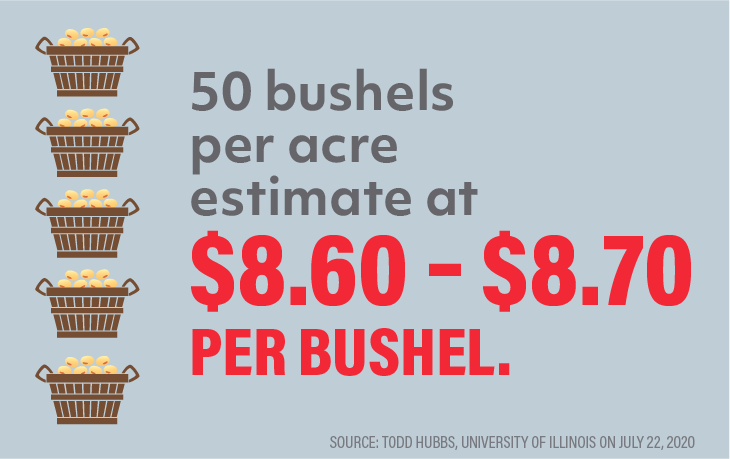As our farm businesses use tax planning tactics to reduce current tax liability impacts, we do not completely reduce the tax but move the tax to a future year. This webinar will provide details on the importance of identifying and calculating your operation’s deferred tax liability and how that can affect your current and future strategic farm management decisions.
Presenter: Dick Wittman, Wittman Consulting, Farm Manager/Family Business... Read More →
ILSOYADVISOR POST
Soybean and Corn Outlook, and Staying Positive Amidst Uncertainty
August 26, 2020
The third week of the Agribusiness Management Program (AMP) Summer Webinar Series featured University of Illinois faculty members who presented on two important topics as we move through the rest of this unprecedented year. Todd Hubbs kicked off the double webinar with his outlooks for soybeans and corn over the next two marketing years. Paul Stoddard then gave some helpful tips on how to handle adversity, stay positive and work through these tough times.
It is extremely difficult to predict what will happen in the agricultural market because of all the uncertainties right now Hubbs said to begin his presentation. Between COVID-19, the presidential election, the United States’ relationship with China and trade deals in general, it’s almost impossible to forecast. But given all those factors, following are six things Hubbs wants farmers to know as they develop their plans for the 19-20 and 20-21 marketing years.
SOYBEANS
- Competition: Moving into 2021, our competition will be very stiff. Brazil’s farmers are having a lot of success which will directly impact us. However, Argentina’s ongoing political troubles will continue to benefit the U.S.
- Exports: Currently, our 2020 export numbers are down, while Brazil’s exports to China are very strong. They are taking advantage of our trade issues with China. So far, 2021 numbers out of China look good as they are rebuilding their hog population after African Swine Fever.
- Acreage and Yield: Soybean acres are up 7.7 million from 2019 and there is a strong likelihood we will harvest 83 million acres of soybeans in 2020—maybe even a little higher than that. In terms of yield, Hubbs feels confident that a 50 bushels per acre estimate is about right and his price outlook for Illinois is at $8.60-8.70/bushel.


CORN
- Demand: One of the biggest impacts on corn has been the decrease in demand due to COVID-19 lockdowns and supply chain issues. Specifically, in gas usage and feed rations. Ethanol production is way down so the 40% of corn that typically goes to ethanol isn’t being used. Corn used in feed also decreased as animals in the supply chain weren’t moving very quickly with restaurants shut down.
- Exports: Mexico, Japan, South Korea and Columbia remain the destination for our exports. China is already buying for the 20/21 marketing year which is a good sign. Brazil is starting to produce their own ethanol, so they won’t need ours.
- Acreage and Yield: 92 million acres were planted in 2020 which is up 2.3 million acres from 2019. Overall, corn looks very good and yield has the potential to break through the USDA outlook of 178.5 bushels per acre.
Demand recovery may depend on the development of a COVID-19 vaccine, and the timing of that is uncertain. Farmers should have a marketing plan, stay active, be realistic and pay attention to what is going on Hubbs said in closing.
21 Things Every 21 Year Old – Or Anyone of Any Age – Should Know
We have all been forced to deal with this year’s turn of events and endless uncertainties. Paul Stoddard has developed a lifelong passion for studying successful people and provided this list of 21 things he wished someone would have told him when he was 21 years old. We can all take away something from this list to apply to our daily lives.
- Learn to think for yourself. Most of us repeat the thoughts/opinions of other people. An original thought is a wonderful thing.
- Travel. Engage in experiential learning. Get to the other parts of this global village. People think differently in different parts of the world.
- Be willing to make some mistakes. The secret to success is failing fast.
- Take time to simply think. The digital world is great, but it tends to take over and create a lot of noise.
- Improve your people skills. Emotional intelligence skills are very important.
- Choose your attitude. You can decide how you react to certain situations.
- Learn to savor the present moment. Be mindful. Be present now. Put yourself in the present moment and push away the negative self-talk.
- There’s always a work-around.
- Be grateful. Develop this as a habit.
- Be authentic. Be yourself. Don’t change your behavior to fit in.
- Ask “the question behind the question”. What can I do about this situation? Instead of suggesting what others can or should do.
- Step out of your comfort zone. Stretch and develop yourself personally.
- Hard work and hardship build character. This is where growth comes, and lessons are learned.
- Learn to actively listen. Listening is the most important part of communication.
- You should probably get started. Don’t worry about how you’ve procrastinated, just get started.
- Define your values. Identify things that are important to you, narrow that list down to ten and put them in priority order.
- Don’t give up on your dream just because it will take a long time to accomplish it. The years will pass anyway, so go ahead and do it.
- Kids develop self-esteem by doing things that are difficult and finding what works. The same is true for adults.
- Your kids are changed more by your example than your words. Kids are always watching, so your values should align with your behavior.
- Don’t worry about getting old. It may exceed expectations and provide a sense of calm and serenity and safety.
- Begin with the end in mind. How would you like to be remembered?
View the full webinars here: https://www.youtube.com/playlist?list=PLlNfbVEKROoIkslWkxDozpXSXMdqcVWE-
For additional AMP information, visit the program webpage at https://www.ilsoyadvisor.com/on-farm/ilsoyadvisor/amp-agribusiness-management.





Comments
Add new comment